THIS WEEK
SOCIETY
Busy Farming
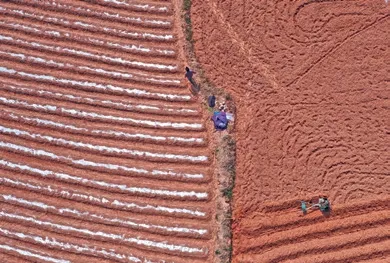
XINHUA
Farmers plough the fields of Pumiao Township,Nanning,Guangxi Zhuang Autonomous Region,on March 2 in preparation for spring sowing.
Cyberspace Regulation
The Cyberspace Administration of China,the country’s cyberspace watchdog,published a draft regulation on March 2 concerning pop-up windows and notification services on online platforms.Public opinion is solicited.
Providers of online services,including operating systems,terminal devices,applications and websites,will not be allowed to push notifications for content involving celebrity gossip and private information,extravagant displays of wealth,or the mocking of personal appearance,according to the draft regulation.
When providing news-alert services,the content of the titles should not be distorted or falsified,it says.
The new regulation will also ban the misuse of algorithms and promotion of information harmful to minors.
Veteran Policy
The Ministry of Veterans Affairs(MVA) signed agreements with six enterprises to expand the use of preferential-treatment cards for veterans and other entitled groups on February 28.
The enterprises include China UnionPay,PetroChina,and China Post,with five of the agreements to take effect from April 8,and the other one from June 1,said the ministry.Once the agreements take effect,the enterprises will provide different degrees of preferential and exclusive priority services for the cardholders,based on their contributions and the enterprises’respective domains.
The agreements aim to enhance the cardholders’ senses of gain and honor,said the ministry.
Application for the preferential cards began on December 14,2021,with the first batch of cards currently in production and soon to be distributed to applicants.
Scientific Advances
The Ministry of Science and Technology issued a list of the top 10 domestic scientific advances of 2021 on February 28.
The selected achievements include theMars probe’s successful landing on the red planet,the successful launch of China’s space station core module,andandmanned spaceships’ successful launch and docking with the core module.
Other advances include starch synthesis from carbon dioxide,lunar evolution revealed by lunar samples brought back by themission,the mechanism via which the coronavirus evades antiviral drugs,and the world’s largest fast radio bursts sample detected by the Five-Hundred-Meter Aperture Spherical Radio Telescope.
The scalable production of high-performing fiber lithiumion batteries,quantum walks on a programmable two-dimensional 62-qubit superconducting processor,a self-powered soft robot swimming in the Mariana Trench,and the causes of bird migration routes and key genes of longdistance migration are also on the list.
Rock Paintings
Rock art carved in a cave estimated to date back to the Paleolithic Era has been discovered in Hainan Province,the first archeological discovery of its kind on the tropical island,Xinhua News Agency reported on March 2.
Archaeologists have determined the Paleolithic site,discovered in Wangxia Township in Changjiang Li Autonomous County,is the oldest human dwelling cave site found in Hainan so far,according to Li Chaorong,a researcher with the Institute of Vertebrate Paleontology and Paleoanthropology at the Chinese Academy of Sciences.
Li said the artworks date back 65,000 to 55,000 years.Remains of the rock paintings extend over 20 meters in the cave.
More research is expected to be conducted on the surrounding geology and environment of the Paleolithic remains.
New Test Kit
A Chinese university has developed a COVID-19 test kit the size of a lighter that allows people to test themselves for virus infection at home using nose swab samples,with results in 30 minutes,Xinhua News Agency reported on March 3.
Once on the market,the price of the portable nucleic acid detection box can be controlled within 100 yuan ($15.8),according to the developer West China Hospital affiliated to the Sichuan University in Sichuan Province.
Professor Hu Wenchuang with the hospital said compared with similar products widely used for home self-screenings in other countries,the new test kit has a higher detection sensitivity and a price advantage.
The scientific fruit is expected to enter commercial production this year,according to the hospital.
Shipwreck Salvage
Salvage of a 160-year-old shipwreck,the largest and bestpreserved wooden shipwreck discovered underwater in China to date,began on March 2.
This sunken ship,with a large number of cultural relics,was a merchant vessel during the reign of Emperor Tongzhi (1862-1875)in the Qing Dynasty (1644-1911).
Named,the ship was found submerged at a depth of 5.5 meters below the seabed in the waters of Hengsha shoal in the northeast of Hengsha Island in Shanghai’s Chongming District.
According to archaeological investigations,the ship is about 38.5 meters long and 7.8 meters at its widest in the middle.It has 31 cabins and is loaded with exquisite cultural relics such as porcelain made in Jingdezhen,a world-famous porcelain-producing region in Jiangxi Province.
Low-Carbon Technology
The Chinese Academy of Sciences (CAS) released a strategic action plan to support scientific and technological efforts to achieve the country’s carbon peak and carbon neutrality goals on March 2.
The plan aims to solve core scientific and technological issues to promote an energy revolution,industrial optimization and upgrading,and a green and low-carbon technological revolution,thus providing strong scientific and technological support for the realization of the country’s carbon peak and carbon neutrality goals.
By 2025,the CAS will have made breakthroughs in a number of key technologies supporting the carbon peak goal and promoting the low-carbon and green transformation of the economy and society,according to the plan.
The CAS aims to have developed these key technologies to meet the highest international standards by 2030.
By 2060,it will have made breakthroughs in a number of original and disruptive technologies,and it will have implemented these to support the realization of the country’s carbon neutrality goal.
Breathing New Life Into Old Heritage
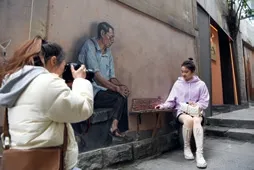
XINHUA
Visitors take photos at Shancheng Alley in Chongqing on February 26.Located on the banks of the Yangtze River and built along mountains and cliffs,the alley lined with historic buildings has been renovated to attract more visitors.
Mastering New Skills

XINHUA
Students with hearing impairments learn to make cakes during a baking class at a special education school in Putian,Fujian Province,on February 24.
NUMBERS
($1=6.32 yuan)
(All changes are y.o.y.)
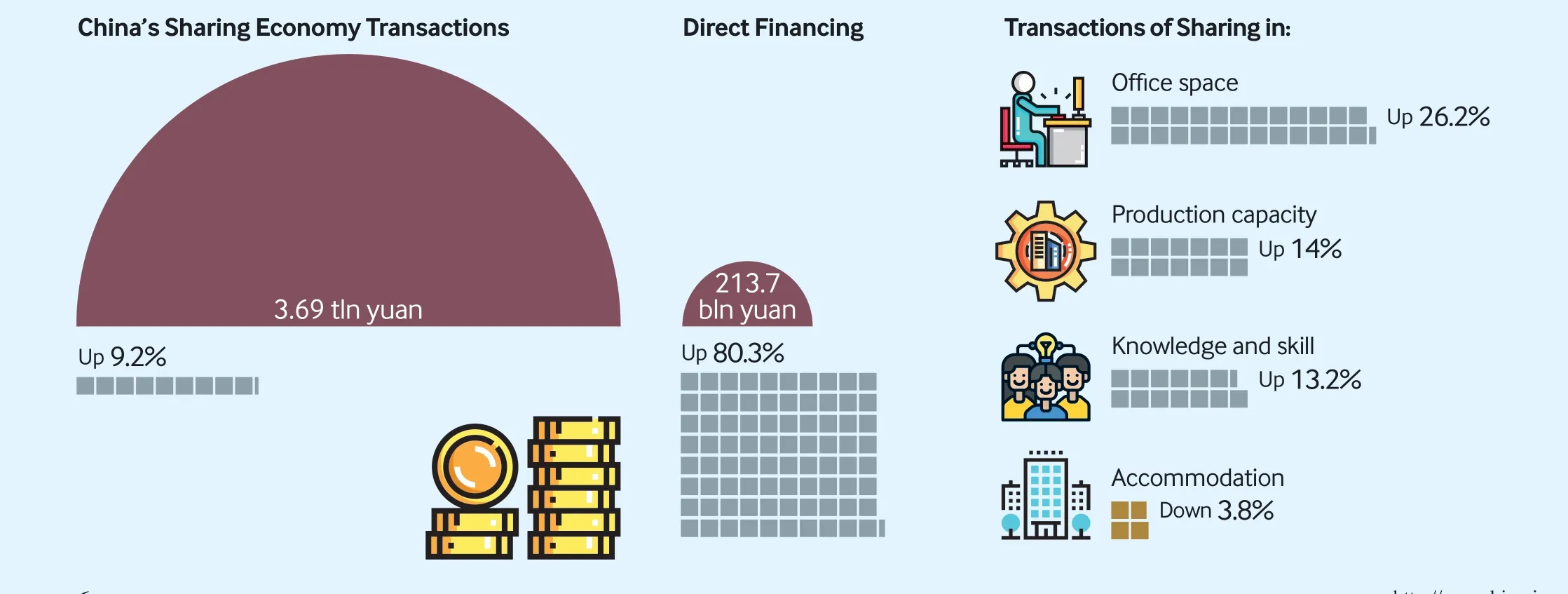
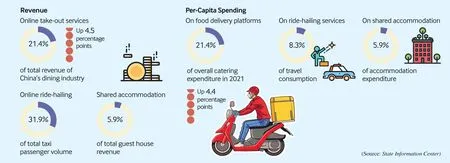
ECONOMY
Manufacturing Hub
China has maintained its position as the world’s largest manufacturing hub for 12 straight years,the Ministry of Industry and Information Technology (MIIT)said on February 28.
The value-added output of the manufacturing sector increased 9.8 percent year on year to 31.4 trillion yuan ($4.97 trillion) in 2021,accounting for 27.4 percent of the national GDP,Minister Xiao Yaqing told a press conference.
Specifically,the output of the hi-tech manufacturing industry went up 18.2 percent,while that of equipment manufacturing increased 12.9 percent,Xiao said,adding that digitalization and green development of the sector had also picked up pace.
China now has more than 4,700 national-level little giant firms,or small enterprises that are still in the early stage of development and focus on the new generations of information technology,sophisticated equipment manufacturing,new energy,new materials,biomedicine and other high-end fields.
The ministry will further stimulate investment in the manufacturing sector,encourage enterprises to level up their technologies and speed up the establishment of 5G services and gigabit fiber-optic networks,according to Xiao.
Engel Coefficient
The Chinese quality of life continued to improve in 2021,with the Engel coefficient of residents down to 29.8 percent from 30.2 in 2020,a communiqué released by the National Bureau of Statistics (NBS) showed on February 28.
The Engel coefficient is the proportion of an individual or a group’s total spending that is devoted to purchasing food.Its decrease suggests a rise in income and living standard.
The Engel coefficient of urban residents was 28.6 percent,while that of rural residents was 32.7 percent,according to the communiqué on China’s economic and social development in 2021.
Annual per-capita consumer spending came in at 24,100 yuan ($3,812),an increase of 13.6 percent over the previous year,or an increase of 12.6 percent in real terms after allowing for inflation.
The per-capita spending of rural residents reached 15,916 yuan ($2,521),up 15.3 percent year on year in real terms,while that of urban residents stood at 30,307 yuan ($4,800),up 11.1 percent from a year earlier after adjusting for inflation.
PMI Changes
The purchasing managers’ index(PMI) for the non-manufacturing sector came in at 51.6 in February,up from 51.1 in January,the NBS said on March 1.
A reading above 50 indicates expansion and below that mark,contraction.
The sub-index for business activities edged up 0.2 percentage point to 50.5 in February,but still lower than the usual level of Spring Festival holiday months in previous years,NBS senior statistician Zhao Qinghe said.
Fueled by the Spring Festival consumption boom,companies in railway transport,air transport,postal-express delivery,culture,sports and entertainment saw their business increase on a month-on-month basis,with their activity sub-indexes all standing above 57,a relatively high level.
But industries including retail,ecological protection and resident services,all greatly affected by the COVID-19 resurgence,saw weaker business activity.
The sub-index for business expectations in the service sector rose 2.9 percentage points from January to 59.6 in February,“signaling an upbeat sentiment of service firms lifted by the gradual market recovery after the Spring Festival and policies to buttress industries facing difficulties,”Zhao added.
The sub-index for business activities in the construction sector stood at 57.6 in February,surging 2.2 percentage points from the previous month.
The NBS data also showed that the PMI for the manufacturing sector came in at 50.2 in February,up from 50.1 in January.
Transport Targets
New rail lines totaling 3,300 km will start operating this year,along with a slew of measures to improve the nationwide transport network,Minister of Transport Li Xiaopeng said on February 28.
More than 8,000 km of expressway will be expanded or renovated,and over 700 km of high-grade waterway will be added or improved,he added.The country will also add eight certified civil-transport airports.
By late 2021,the total operating length of China’s high-speed railway network had exceeded 40,000 km.Expressways and high-grade waterways increased to more than 168,000 km and over 16,000 km,respectively.
New Oil Tanker
The world’s first crude oil tanker equipped with liquefied natural gas (LNG) dual-fuel main engine,generator and boiler has been delivered to China’s shipping giant COSCO Shipping.
The ship,333 meters in length and 60 meters in width,uses LNG as its main fuel.It will be assigned to the Yangpu Port in Hainan Province,adding the number of the port’s registered ships for international voyages to 32,according to COSCO Shipping.
The use of clean energy in shipping is expected to help reduce sulfur oxides emissions by 99 percent and particulate matter by 98 percent,compared with current oil tankers.
In gas mode,the ship has a range of 12,000 nautical miles.In dual-fuel mode,its duration can reach up to 24,000 nautical miles.
Unmanned Vehicles
The city of Yangquan in Shanxi Province issued a license to Baidu for the commercial operation of its unmanned autonomous driving services on February 26—the first of its kind in China.
“That means a safety supervisor is no longer required in the driver’s seat in Baidu’s autonomous vehicles operating in designated areas of the city,”Nie Yuren,General Manager of Baidu Intelligent Driving Business Group Solutions,said.The license also allows for fare collection.
Baidu launched its autonomous driving research and development in 2013.The company has so far carried out road tests in nearly 30 Chinese cities.
Also on February 26,the fifth Apollo Park,a test base for Baidu’s autonomous driving and related infrastructure systems,opened in Yangquan.It follows Beijing,Guangzhou in Guangdong Province,Shanghai,and Wuzhen in Zhejiang Province.
Silver Economy
Calculated at 2010 prices,the total consumption by senior citizens is expected to reach 12-15.5 trillion yuan ($1.9-2.46 trillion) in 2030,accounting for 8.3-10.8 percent of China’s GDP,according to a report issued by the China Research Center on Aging on March 1.
By 2050,the group’s consumer spending is estimated to soar to 40-69 trillion yuan ($6.3-10.9 trillion),making up 12.2-20.7 percent of the GDP,it said.
China has 264 million people aged 60 and above,accounting for 18.7 percent of its 1.4 billion population,according to the seventh population census conducted in 2020.
WORLD
KENYA
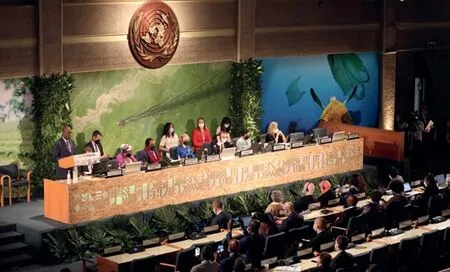
XINHUA
The Fifth Session of the UN Environment Assembly (UNEA-5) resumes in Nairobi on February 28.Delegates renewed their call for action on climate change,pollution and biodiversity loss to secure a green and resilient future for humanity
BRAZIL

XINHUA
Revelers attend carnival celebrations in Rio de Janeiro on February 26
NEW ZEALAND

XINHUA
People inside the International Arrivals Hall at Auckland Airport on February 28.Fully vaccinated nationals and other eligible travelers from Australia were allowed to enter New Zealand without mandatory quarantine from 11:59 p.m.on March 2 onward.This is the first stage of the country’s five-step reconnecting plan
SPAIN
A visitor experiences a simulated driving device during the Mobile World Congress in Barcelona on February 28.The four-day event presented new technologies and hardware

XINHUA
BELARUS
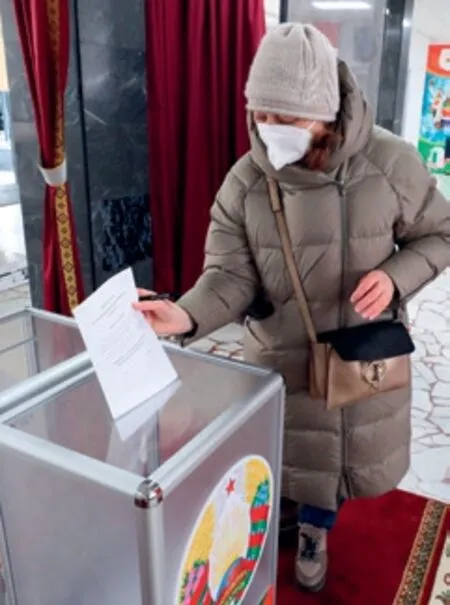
XINHUA
A citizen votes during the referendum on constitutional amendments at a polling station in Minsk on February 27.Under the new Constitution,clauses on the“non-nuclear”and“neutral”status of Belarus are removed
INDONESIA

XINHUA
Search and rescue team members comb through a muddy area caused by landslides after a 6.1-magnitude earthquake hit Pasaman Barat,West Sumatra,on February 27.Eleven died in the quake
PEOPLE &POINTS
NEW MINISTER OF CIVIL AFFAIRS
was appointed minister of civil affairs by the Standing Committee of the National People’s Congress,China’s top legislature,on February 28.
Tang has previously served as deputy head in charge of the National Development and Reform Commission.
Born in Shanghai in 1964,Tang traces his ancestry to Jianhu County in Jiangsu Province.He studied Mechanical Engineering at Tongji University.Following graduation,he worked as a technician and later held different managing posts at various automotive companies in Shanghai.
He has also served as governor of Fujian Province and director of the China National Space Administration,chief executive of state-owned China South Industries Group and head of the State Administration of Science,Technology and Industry for National Defense.

Bottom Line for Food Security
March 2
According to the Ministry of Agriculture and Rural Affairs,China had seen 18 consecutive years of bumper harvests in grain output by 2021.
Decades of hard work to upgrade the agricultural sector have ensured China’s food supply can meet demand,and today,the focus has shifted from sufficiency to quality.Yet food security is still vital to the survival and health of human beings,as well as the peace and development of society.
Despite its continuous grain harvests,China must confront the realities of its huge population,comparatively low freshwater resources and limited scale of organized farming.Then there’s the matter of industrialization and urbanization encroaching on arable land,plus the growing demand for animal feed grains as overall meat consumption is on the up.Currently,China still relies heavily on imported grain,which accounts for 24 percent of its total grain consumption.
Considering these negative factors,the whole country should always be on the alert for food shortages.
Solid Solutions
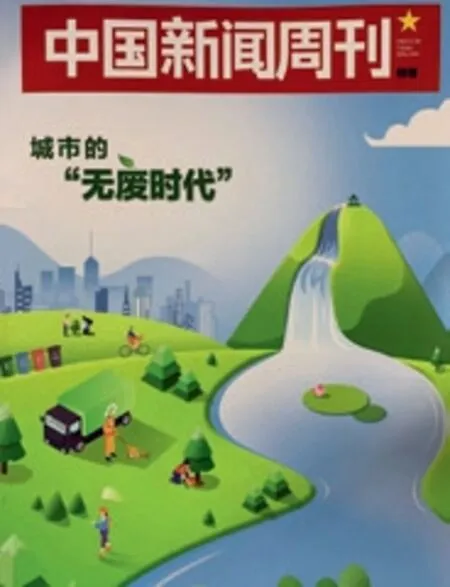
February 28
Solid wastes are besieging Chinese cities on the fast track toward industrialization.This kind of waste includes not only domestic garbage,but also industrial and agricultural trash as well as hazardous waste.Nationwide,the annual growth of solid waste stands at 10 billion tons.Dealt with through landfills and waste stacks,urban areas will suffer contractions and damage,while the air,soil and underground water are polluted,posing a threat to human health.
How to tackle the problem,then? One way is to promote a greener way of life and development.The key is to reduce the amount of solid waste,and then recycle as much as possible.
Waste reduction requires the scientific planning and upgrading of various industries in the process of production.It’s important to maximize the efficiency of the complete resource application through cross-industry and regional industrial chains.
This complex system of engineering petitions cooperation between the government,relevant industries and the public.The government focuses on designing and policy guidance,various industries develop effective ways of dealing with solid waste,while the public should always practice its social responsibility of environmental protection.
famous U.S.diplomat,in his video speech during a ceremony commemorating the 50th anniversary of the Shanghai Communiqué on February 28
China’s Ambassador to the U.S.,in a tweet after meeting with U.S.National Basketball Association representatives during a Los Angeles Lakers game on February 27
,spokesperson for the Foreign Ministry,at a news briefing on February 25
,Executive Director of the UN Environment Program,at the Fifth Session of the UN Environment Assembly on February 28
Fee Cuts to Buttress Business
March 1
The catering industry witnesses falling footfall and mounting operating costs amid the COVID-19 pandemic,with small businesses taking a hard hit.More than ever,they must now rely on food delivery platforms to meet their sales quota,but the latter’s high commission rates are imposing an increasingly heavy burden.
To lend the battered catering businesses a helping hand,the Chinese Government has worked out detailed measures,including how to cut platform commissions,in a bid to provide some relief.
The catering industry absorbs a large amount of the labor force,playing a special role in stabilizing and stimulating the country’s economy.Though delivery platforms also face difficulties of their own,they have more leeway to recover and prosper than their small brick-and-mortar counterparts.As tech giants,they are obliged to shoulder more social responsibilities.Higher consumption levels will eventually benefit both catering businesses and platforms.
Meanwhile,individual entities should also try to explore innovative ways of expanding their business.A smoother relationship between small businesses and big platforms based on the market mechanism will help both sides tide over current strains.
TSINGHUA’S NEW PRESIDENT
was recently appointed president of Tsinghua University,while its former president,Qiu Yong,has been named its Party chief,the Ministry of Education said on February 25.
Wang got his bachelor’s degree at Tsinghua in 1991.After graduating with a doctorate in Electronic Engineering in 1996,he took up a teaching post at the university.Later,he served in different posts,including dean of the Department of Electronic Engineering,deputy dean of the School of Information Science and Technology,director of the Personnel Department and the Human Resources Development Office,assistant to the president and executive vice president.
Tsinghua is a major public research university in Beijing.Since its establishment in 1911,it has produced many prominent figures in science,engineering,politics,business,academia and culture.

- Beijing Review的其它文章
- SUFFICIENT SUPPLIES
- Time to Cancel ‘35’Recruitment?

